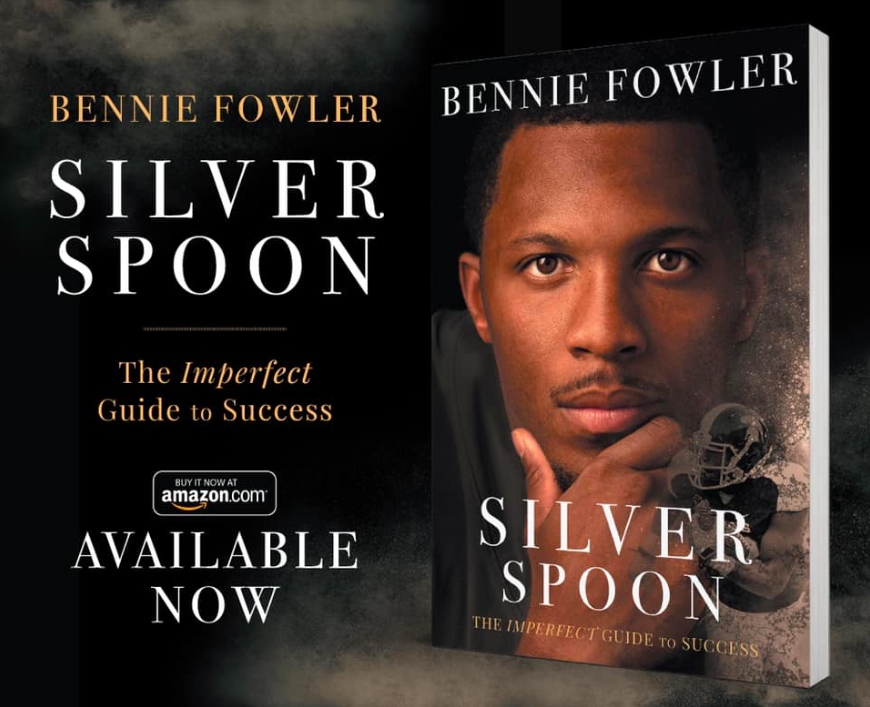The following is adapted from Silver Spoon: The Imperfect Guide to Success.
What do you do when you hit an obstacle? Do you tell yourself it wasn’t meant to be and give up? Do you comfort yourself with a movie and a pint of Ben & Jerry’s? Or do you get up and try again?
When I know how you would answer the question above, I can tell you a lot about your success. The reason? No one ever succeeded without overcoming adversity. And no one ever overcame adversity without perseverance.
I’ve experienced some huge highs in my football career. I’ve also taken some punches to the gut. The highs wouldn’t have been possible without meeting the lows head-on and choosing to power through.
The same is true for you, even if you’re in a completely different field. It doesn’t matter what you do. If you want extraordinary success, you need to exercise extraordinary perseverance.
When Disappointment Hits
It took a lot of perseverance for me to carve out a place for myself in the NFL. A huge dose of that came on the day of the draft.
Being selected in the draft is every football player’s dream. It guarantees a shot at playing at the pinnacle of the sport. It’s a longshot for anyone. There are typically 2,000 seniors at Division I colleges and 3,500 players at Division II schools eligible for the draft each year. Still, only about 250 players are selected in the seven rounds of the draft.
In the year I was eligible, NFL teams selected 256 players, including thirty-three wide receivers. The odds of anyone being selected are long, but I felt confident, and my agent felt optimistic too. We felt, with good reason, that I had the numbers to be selected as a wide receiver somewhere between the fourth and seventh rounds.
I’d excelled during my time at Michigan State. In addition to coming off a Big 10 Championship and victory in the 100th Rose Bowl, I led the team in receptions, yards, and touchdowns. I led the Big 10 in yards per reception and battled through some early adversity—mostly injuries—to establish myself in my junior and senior seasons.
When draft day came, we settled in to monitor the selection announcements and wait for a phone call from a coach or a general manager for one of the teams. I didn’t worry when I wasn’t selected in the first few rounds. I hadn’t expected my phone to ring that quickly. But as the rounds kept passing, my phone stayed silent and I became increasingly anxious.
In the last two rounds, six and seven, some NFL teams called, but it wasn’t with the news I had been selected. Instead, they called to see if I’d be interested in joining their organization as a free agent. The draft ended. I wasn’t picked.
Paging Perseverance
I want to tell you I took the disappointment of not being drafted in my stride, but the truth is it hurt like hell. I was disappointed and a little pissed off. I’d sacrificed and worked hard for the opportunity and hated to see it slip away.
I was down, but I wasn’t out. I still had the option of signing as a free agent. A lot of players actually prefer to go undrafted; the money they make can be similar to that of a late-round pick, and they can choose where they want to go.
Not me: I wanted to hear my name called on national television on draft day. But I didn’t get to make that choice. Although the Detroit Lions offered me the most money, I’d spent my entire life in Michigan and wanted to see some new sights, so I signed with the Denver Broncos.
I also knew that by signing with Denver, I’d be catching passes thrown by Peyton Manning, one of the greatest quarterbacks to ever play the game. I figured that if I could be successful in Denver with Peyton, I’d have the goods to play with anyone in the league.
It was too good an opportunity to pass up and a chance to channel the pain of not being drafted into a positive direction.
A Double Dose of Adversity
That Denver Broncos roster was stacked. In addition to Peyton, Denver also had veteran pass catchers like Demaryius Thomas, Julius Thomas, and Wes Welker. Wes had also been an undrafted free agent—in 2004—and had gone on to lead the league in receptions for three years (2007, 2009, and 2011) while playing for the New England Patriots.
Learning my position from these guys was like getting a Harvard education on being an NFL receiver. In short order, the team also added Aqib Talib, Demarcus Ware, and T.J. Ward on defense, plus another amazing receiver in Emmanuel Sanders.
I took that first training camp in Denver one day at a time. I tried not to live too much in the future. I aimed to learn and love every moment in that camp, and to take away as much knowledge as I could from the veterans around me. I didn’t get caught up in worries about the future.
Despite this learning trajectory, I got more bad news at the end of camp: I’d been cut.
In the NFL, players who get cut during camp remain on the waiver wire for twenty-four hours and any team in the league can claim them. If that doesn’t happen, your team can keep you on its practice squad, a reserve unit that acts in practice as the upcoming week’s opponents. You draw a salary and are technically on the team, but it’s a difficult existence. No waiver wire claim came, and I was signed to Denver’s practice squad.
I endured tremendous uncertainty that season. There is no job security. The team can cut you whenever it wants or whenever it finds another player it likes better. You could be playing exceptionally well but if the team needs to stash a free agent on the squad, you could be cut in an instant.
It’s precarious.
But I survived the season. Afterward, Julius Thomas took me under his wing and helped me improve as a player and as a person. Julius and I have similar personalities. After the season, he invited me to train with him in Los Angeles. It was a risky and expensive proposition, but I was all-in. I invested all my savings to work with his receiver coach and weight trainer, cover my expenses, and also to have a little fun. When we were through, I felt I had the skill and resolve needed for the next level.
The next season, I made the 53–man roster. I went on to win a Super Bowl with the Broncos, catching the pass that secured the game. Persevering through difficulties turned out to be worth it, a million times over.
What’s Your Perseverance Quotient?
We talk a lot about IQ (intelligence quotient), implying that success is defined by a genetic gift. But everyone I’ve ever known who calls themselves truly successful has hit tough times and found a way through. Even though we all define success differently, finding the strength to persevere is an essential component.
Perseverance is not a natural talent. It’s not like height or speed or vertical leap, things that are mostly the product of the genetic lottery (although any trait can be improved with practice). It’s a skill that can be learned and honed over time.
Take a moment to think about your perseverance quotient. What’s your first response when things don’t go your way? Do you crumble, or do you come back stronger? Whatever you want to achieve in life, you’ll need perseverance to make it happen.
That comes from practice. It comes from getting up when you don’t feel like it and doing the hard thing. It comes from setting your vision and pursuing it like your life depends on it. Because it does.
For more advice on perseverance, you can find Silver Spoon: The Imperfect Guide to Success on Amazon.

Bennie Fowler is a six-year veteran of the NFL. He holds the annual Bennie Fowler Youth Football Camp in Detroit, Michigan, is an in-demand speaker trained through the NFL Speakers Bureau. He currently lives in Denver, CO during the offseason.


